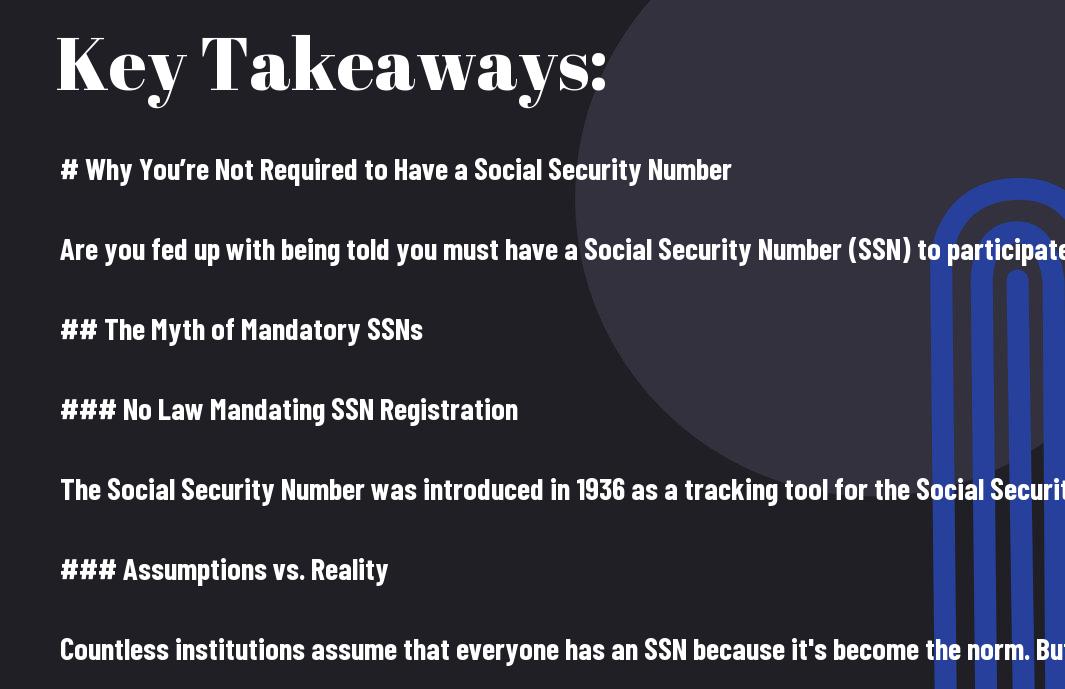
Most Americans assume having a Social Security Number (SSN) is a legal requirement, but this widely-held belief isn’t entirely accurate. While an SSN facilitates many aspects of modern life, no federal law mandates U.S. citizens to obtain one. You might be surprised to learn that certain religious groups, privacy advocates, and even some U.S. residents legally navigate life without this nine-digit identifier. Understanding your rights regarding SSNs can be crucial for maintaining personal privacy and autonomy in today’s interconnected world. Whether you’re exploring alternatives or simply curious about your options, it’s vital to know that living without an SSN is legally possible, though it requires careful planning and knowledge of your rights.

Key Takeaways:
- There is no federal law that explicitly requires U.S. citizens to obtain a Social Security Number, making it a voluntary system rather than a mandatory requirement.
- Certain groups, including some religious communities and individuals choosing to live off-grid, can legally live without a Social Security Number through various exemptions and alternatives.
- While living without an SSN is possible, it requires careful planning and may present challenges with traditional banking, employment, and accessing certain services.
- Alternative identification methods exist, such as Individual Taxpayer Identification Numbers (ITINs), which can be used in place of an SSN for various purposes.
- The widespread belief that Social Security Numbers are mandatory stems from institutional convenience rather than legal requirements, and individuals have the right to question and refuse an SSN in many situations.
The Legal Framework of Social Security Numbers
The foundation of Social Security Numbers rests on the Social Security Act of 1935, which established a system for tracking earnings and distributing benefits. While the system has evolved significantly, it’s crucial to understand that the Act doesn’t mandate universal participation. Your right to choose whether to participate in the Social Security system is protected by various legal provisions and court decisions.
Historical Development and Original Purpose
Any examination of SSN requirements must consider its origins in 1936 as a voluntary program. Your ancestors weren’t automatically assigned numbers; they had to apply for them. The system was initially designed solely to track your Social Security benefits and contributions, not as the universal identifier it has become today.
Current Legal Status
Legal analysis reveals that no federal statute explicitly requires you to obtain a Social Security Number. Your right to live without an SSN is protected, though certain privileges and services may be harder to access. Many institutions request SSNs due to convenience rather than legal necessity.
Historical records show that your ability to function without an SSN has become more challenging as private institutions adopted it as a default identifier. However, alternative identification methods remain legally valid, and you retain the right to use them.
Constitutional Implications
Security of your personal information and privacy rights intersect with SSN requirements. Your constitutional rights, including religious freedom and privacy protections, can provide grounds for refusing to obtain or use a Social Security Number.
Implications of court decisions consistently support your right to refuse an SSN, particularly when based on religious or philosophical objections. Your fundamental rights often supersede institutional preferences for using SSNs as identification.
Common Misconceptions About SSN Requirements
If you’ve been told that having a Social Security Number is mandatory for all U.S. citizens, you’ve been misinformed. No federal law requires you to obtain an SSN. While many institutions make it seem mandatory, this is often due to convenience rather than legal requirements. Understanding these misconceptions can help you make informed decisions about your rights and options.
The Voluntary Nature of Social Security
Above all, you should know that participation in the Social Security system is fundamentally voluntary. The Social Security Act of 1935 established it as an optional program, though decades of institutional practices have obscured this fact. Your right to opt out remains protected, especially for religious or philosophical reasons.
Employment Without an SSN

Requirements for employment without an SSN are more flexible than commonly believed. You can legally work through alternative arrangements, including independent contracting, self-employment, or positions with employers who accept ITINs (Individual Taxpayer Identification Numbers).
And while traditional employers might insist on an SSN, you have legal alternatives. The IRS provides ITINs specifically for individuals who either cannot or choose not to obtain an SSN, allowing you to fulfill tax obligations while maintaining your choice.
Banking and Financial Services Alternatives
Services in the financial sector are increasingly accommodating to those without SSNs. You can access banking services through institutions that accept alternative forms of identification, including ITINs, passports, or other government-issued IDs.
This flexibility extends to various financial services, where innovative solutions are emerging to serve the unbanked and those choosing to live without SSNs. Credit unions and alternative financial institutions often provide more accommodating policies than traditional banks.
Religious and Personal Exemptions
After understanding your rights, you should know that religious and personal exemptions from Social Security Numbers are legally recognized in the United States. These exemptions stem from constitutional protections and established legal precedents, offering you legitimate pathways to live without an SSN if you meet specific criteria.
Religious Freedom and SSN Exemptions
Freedom of religion provides you with protection under the First Amendment when refusing a Social Security Number based on genuine religious beliefs. Members of certain religious groups, such as some Amish and Mennonite communities, have successfully obtained exemptions from the Social Security system.
Conscientious Objector Status
After filing for conscientious objector status, you may be eligible to legally opt out of the Social Security system based on your sincere moral or religious convictions against participating in government identification systems.
Due to the complexity of obtaining conscientious objector status, you’ll need to demonstrate that your objection is based on deeply held beliefs rather than social, political, or economic considerations. Your application must clearly articulate how having an SSN would violate your core beliefs.
Documentation Requirements
Religious exemption requests require you to provide specific documentation supporting your claim, including letters from religious leaders, personal statements explaining your beliefs, and evidence of your membership in a recognized religious organization.
The documentation process demands your attention to detail. You’ll need to submit Form 4029 to the Social Security Administration, provide proof of your religious affiliation, and demonstrate that your religious group has a history of providing for its dependent members.
Alternative Identification Methods
Despite the widespread belief that a Social Security Number is mandatory, several legal alternatives exist for identification purposes. These options can help you navigate financial, employment, and governmental systems while maintaining your right to live without an SSN. Each alternative serves specific purposes and comes with its own set of advantages and limitations.
Individual Taxpayer Identification Number (ITIN)
Below are the basics of the ITIN system: it’s a tax processing number issued by the IRS for individuals who need to file taxes but are ineligible for an SSN. You can use your ITIN to open interest-bearing bank accounts, file tax returns, and conduct various financial transactions without requiring a Social Security Number.
State-Issued Identification
Number of states now offer alternative identification options that don’t require an SSN. These include state ID cards, driver’s licenses, and other government-issued documentation that can serve as primary identification for many purposes.
Consequently, you can utilize these state-issued IDs for most daily activities, including banking, employment verification, and accessing public services. Some states have specific provisions for religious objectors and others who choose not to obtain an SSN.
International Documentation Options
ITIN holders and international residents can also use passport-based identification systems and other globally recognized documents. These alternatives are particularly useful for conducting business and establishing identity in international contexts.
Due to globalization and increasing recognition of diverse identification needs, many institutions now accept international documentation as valid forms of ID. This includes consular identification cards, foreign passports, and other internationally recognized documents.
Living Without an SSN: Practical Considerations
Your decision to live without a Social Security Number requires careful planning and understanding of alternative solutions. While living without an SSN is legally possible, you’ll need to navigate various aspects of daily life differently from most Americans. Understanding these practical considerations will help you make informed decisions about your SSN-free lifestyle.
Employment Opportunities

Above all, you should know that working without an SSN is possible through specific arrangements. You can pursue self-employment, contract work, or positions with employers who accept alternative tax identification methods. Some religious organizations and small businesses may be more accommodating to your SSN-free status.
Financial Services
An increasing number of alternative financial institutions now offer services without requiring an SSN. You can access basic banking services through certain credit unions and community banks that accept ITINs or other forms of identification.
Services like money orders, prepaid debit cards, and cryptocurrency provide additional financial flexibility. You’ll find that some local banks and international financial institutions are more willing to work with SSN-free customers, though you may need to provide additional documentation.
Healthcare Access
With proper planning, accessing healthcare without an SSN is achievable. Many direct primary care practices and cash-pay medical providers will work with patients who don’t have SSNs, focusing instead on alternative identification methods.
Practical solutions for healthcare include joining healthcare sharing ministries, negotiating cash payments, and working with providers who understand religious or personal exemptions. Some medical facilities cannot legally deny you emergency care based on lack of SSN.
Legal Rights and Protections
Unlike what many institutions might tell you, you have significant legal rights when it comes to Social Security Number requirements. The Social Security Act of 1935 established SSNs as voluntary identifiers, and various federal statutes protect your right to refuse one under certain circumstances. Your decision to live without an SSN is backed by both statutory and case law, though you’ll need to understand these protections to exercise them effectively.
Privacy Laws
After the Privacy Act of 1974, government agencies must disclose whether providing your SSN is mandatory or voluntary and cite the legal authority for requesting it. This law gives you the power to question and challenge SSN requirements, ensuring your privacy rights are protected when dealing with federal agencies.
Anti-Discrimination Statutes
On both federal and state levels, laws protect you from discrimination based on your choice not to have an SSN, particularly when religious or personal beliefs are involved. These statutes ensure you can’t be unfairly denied vital services solely because you don’t have a Social Security Number.
For instance, employers must provide reasonable accommodations if your religious beliefs prevent you from obtaining an SSN, and financial institutions are required to accept alternative forms of identification under certain circumstances. The Civil Rights Act and Religious Freedom Restoration Act offer additional protections.
Constitutional Safeguards

Across the legal spectrum, your constitutional rights, including freedom of religion and privacy, support your ability to live without an SSN. The First and Fourth Amendments particularly reinforce these protections, ensuring your right to make this personal choice.
Consequently, when you face resistance from institutions demanding an SSN, you can invoke these constitutional protections. Courts have consistently upheld individual rights in cases where mandatory SSN requirements conflicted with protected religious beliefs or privacy concerns.
Navigating Government Systems
Many government agencies have established procedures for individuals without a Social Security Number (SSN). While operating without an SSN can present challenges, you’ll find that alternative identification methods and specific exemption processes exist. Your success in navigating these systems depends largely on understanding your rights and being prepared to provide appropriate documentation to support your position.
Tax Obligations
About your tax responsibilities: you can fulfill them without an SSN by applying for an Individual Taxpayer Identification Number (ITIN). The IRS issues ITINs specifically for individuals who need to comply with tax laws but either cannot or choose not to obtain an SSN. This allows you to maintain tax compliance while exercising your right to forgo an SSN.
Benefits and Services
To access various services and benefits, you have several alternatives. Many institutions now accept alternative forms of identification, such as ITINs, state-issued IDs, or passport numbers. Your right to access crucial services remains protected, even without an SSN.
Indeed, while some services might require additional documentation or alternative procedures, you’ll find that most basic needs can be met through proper planning and knowledge of your rights. Financial institutions, healthcare providers, and educational institutions often have established protocols for serving individuals without SSNs.
Legal Documentation
With proper documentation, you can establish your identity and legal status without an SSN. Key documents might include birth certificates, passports, or state-issued identification. Your right to refuse an SSN is protected under various circumstances, including religious beliefs and personal choice.
In fact, maintaining comprehensive documentation of your identity and legal status becomes particularly important when operating without an SSN. You’ll need to be prepared to demonstrate your legal right to decline an SSN and provide alternative identification methods when necessary.
Common Challenges and Solutions
Not having a Social Security Number can present certain obstacles in your daily life, but each challenge has viable solutions. From employment to banking and healthcare, understanding your rights and available alternatives is imperative. While some institutions might initially resist serving you without an SSN, knowing the law and your options can help you navigate these situations successfully.
Employer Education
One of the most common hurdles you’ll face is explaining your SSN status to potential employers. You have the legal right to work without an SSN under specific circumstances, particularly if you have religious objections or alternative tax identification. Your employer may need guidance on Form W-8BEN or other acceptable documentation.
Banking Relationships
Below are several options for managing your finances without an SSN. Many credit unions and some smaller banks will work with alternative forms of identification, such as an ITIN or valid passport, allowing you to maintain imperative banking services.
Another important aspect to consider is that you can legally open certain types of accounts without an SSN, including basic checking accounts at select institutions. Some international banks operating in the U.S. are more accommodating to customers without SSNs, particularly if you maintain substantial deposits.
Healthcare Provider Communication
Behind many medical facilities’ SSN requirements lies a simple billing practice rather than a legal mandate. You have the right to receive medical care without providing an SSN, though you may need to arrange alternative payment methods.
At the core of successful healthcare provider relationships is clear communication about your status. Many providers will accept cash payments or alternative identification, and some faith-based healthcare sharing ministries don’t require SSNs for membership.
Identity Protection Benefits
For those considering life without a Social Security Number, the identity protection advantages are significant and far-reaching. Without an SSN, you substantially reduce your vulnerability to various forms of identity theft and financial fraud that typically rely on this identifier. Your personal information becomes more secure and harder to compromise, offering a layer of protection that SSN holders don’t enjoy.
Reduced Identity Theft Risk
By not having a Social Security Number, you eliminate the primary target that identity thieves use to commit fraud. Your risk of becoming a victim drops dramatically, as criminals can’t exploit what you don’t have. Statistics show that over 650,000 identity theft reports in recent years involved SSN fraud, making your decision to avoid one a powerful protective measure.
Enhanced Privacy
Any information linked to your SSN becomes part of your permanent digital footprint. Without one, you maintain greater control over your personal information and who has access to it. Your privacy remains more intact, free from the widespread tracking and data collection that typically occurs through SSN usage.
At the core of privacy protection, your choice to forgo an SSN means fewer organizations can track your financial activities, employment history, or personal transactions. This creates a significant barrier between your private life and institutional surveillance systems.
Data Security Advantages
Any breach of databases containing SSNs can expose millions to fraud. Without an SSN, you’re automatically excluded from these large-scale data breaches that frequently occur. Your personal information stays more secure simply because it’s not part of these vulnerable systems.
Hence, your decision to live without an SSN creates a natural shield against digital threats. While others worry about their information being compromised in the next major data breach, you maintain a significantly lower risk profile in the digital world.
The Global Perspective

Once again, when considering your right to live without a Social Security Number, it’s important to understand that many countries function perfectly well with different identification systems. In fact, several developed nations don’t rely on a single universal identifier like the SSN, demonstrating that alternative approaches are not only possible but can be more privacy-protective for their citizens.
International Identification Systems
An examination of global identification methods reveals that many countries use multiple, purpose-specific identifiers rather than a single number. For example, some European nations maintain separate numbers for healthcare, taxation, and social benefits, giving you more control over your personal information and reducing the risk of identity theft.
Foreign National Options
Beside traditional identification methods, you have several alternatives as a foreign national in the U.S., including Individual Taxpayer Identification Numbers (ITIN) and employer identification numbers. These options can help you navigate financial and legal requirements without an SSN.
But it’s important to note that these alternatives aren’t just stopgap measures. They’re legitimate, government-recognized identification methods that can serve your needs effectively. Many international businesses and entrepreneurs successfully operate using these alternative identification systems.
Cross-Border Considerations
Perspective on international identification systems shows that you can effectively manage cross-border transactions and relationships without relying on an SSN. Many global citizens successfully navigate multiple jurisdictions using various forms of identification.
Another crucial aspect to consider is that international law recognizes multiple forms of identification, and you’re not limited to using an SSN in global commerce or travel. Understanding these options can help you make informed decisions about your identification choices while maintaining your privacy rights.
Future Trends and Implications
Now, as digital identity systems evolve and privacy concerns grow, your ability to live without a Social Security Number may become both easier and more challenging. Emerging blockchain technologies and decentralized identification systems are creating new alternatives to traditional SSN-based identification. However, increased digital surveillance and financial tracking could make SSN-free living more complex in certain areas.
Digital Identity Evolution
Implications of new digital identity systems could transform how you navigate life without an SSN. Blockchain-based identification and self-sovereign identity solutions are emerging as viable alternatives, potentially offering you more control over your personal information while maintaining privacy.
Privacy Technology Developments
Implications of advancing privacy technologies are creating new opportunities for you to protect your identity. Zero-knowledge proofs and decentralized finance systems could allow you to conduct transactions and verify your identity without revealing personal information.
A significant shift is occurring in privacy-preserving technologies, with cryptocurrency adoption and peer-to-peer systems becoming more mainstream. These developments could provide you with more options for banking, employment, and daily transactions without relying on an SSN.
Legislative Changes
Between evolving privacy laws and digital identity regulations, your rights regarding SSN alternatives are likely to expand. Recent legislative proposals and privacy protection acts suggest a growing recognition of alternative identification methods.
Further developments in legislation could strengthen your right to refuse an SSN. State-level privacy laws and federal identity protection measures are increasingly acknowledging the need for alternative identification systems, potentially making it easier for you to live SSN-free.
Making the Decision
Your journey to living without a Social Security Number requires careful consideration of personal, legal, and practical implications. This decision can significantly impact your financial options, employment opportunities, and daily interactions with institutions. While it’s entirely legal to live without an SSN, you’ll need to be prepared for the challenges and alternative solutions available.
Personal Assessment
Assessment of your specific situation is crucial before proceeding. Consider your religious beliefs, privacy concerns, or philosophical objections to having an SSN. Evaluate your current lifestyle, including employment, banking needs, and future plans. Understanding your motivations will help you navigate the challenges ahead.
Legal Consultation
To ensure a smooth transition, consulting with a legal professional who specializes in Social Security law is important. They can guide you through the specific exemptions available and help you understand your rights under federal law.
In fact, legal experts can provide detailed insights about alternative identification methods, help prepare necessary documentation, and advise on handling potential challenges with employers, banks, and government agencies.
Implementation Strategy
Against common misconceptions, implementing your decision requires a well-planned strategy. This includes identifying SSN-free banking options, understanding employment alternatives, and preparing necessary documentation for various services.
This strategic approach should include building a network of SSN-alternative friendly institutions, preparing responses to common challenges, and establishing alternative methods for necessary services like healthcare and housing.
Documentation and Record-Keeping
All your efforts to live without a Social Security Number require meticulous documentation. You’ll need to maintain detailed records of your communications with government agencies, employers, and financial institutions. This documentation serves as your protection and proof of your legal right to refuse an SSN.
Essential Papers
Behind every successful SSN-free lifestyle is a well-organized system of critical documents. These include your birth certificate, passport, religious exemption letters (if applicable), and any correspondence proving your right to refuse an SSN. Keep both physical and digital copies in secure locations.
Alternative ID Systems
By utilizing other forms of identification, you can navigate many systems without an SSN. Your options include an Individual Taxpayer Identification Number (ITIN), state ID cards, and passport numbers as viable alternatives.
Alternative identification methods continue to evolve as more people choose to live without SSNs. Some institutions now accept biometric identification, while others may work with specialized identity verification services that don’t rely on Social Security Numbers.
Legal Correspondence
An organized system for handling legal communications is important. You’ll need to maintain records of all formal requests for SSN exemptions, responses from authorities, and any related legal documents.
Plus, maintaining detailed records of your interactions regarding SSN requirements can help establish precedent for future situations. This includes keeping copies of successful exemption requests and documentation of alternative arrangements made with various institutions.

Conclusion
Now you understand that having a Social Security Number is not a legal requirement but rather a societal norm that’s become deeply embedded in American life. While living without an SSN may present certain challenges, you’re equipped with the knowledge that alternative paths exist. Whether you choose this route for religious reasons, privacy concerns, or personal convictions, you can legally navigate life without an SSN. Your rights and choices matter, and you’re not alone in questioning the necessity of this identification system. Be mindful of, informed decisions about your identification options empower you to live according to your values and beliefs.
FAQ
Q: Is there a federal law requiring everyone to have a Social Security Number?
A: No, there is no federal law mandating that U.S. citizens must obtain a Social Security Number. The Social Security system was created as a voluntary program, and while it’s widely used, it’s not legally required for everyone.
Q: Who can legally live without a Social Security Number?
A: Several groups can legally live without an SSN, including members of certain religious communities like the Amish, individuals choosing to live off-grid, and some non-citizens without work authorization. Each group has specific rights and exemptions under the law.
Q: How can someone manage banking and employment without an SSN?
A: Alternative options exist for both banking and employment. Some credit unions accept Individual Taxpayer Identification Numbers (ITINs), and certain types of work, particularly self-employment and contract work, don’t require an SSN. However, it requires research to find institutions that accommodate non-SSN individuals.
Q: What are the main challenges of living without a Social Security Number?
A: The primary challenges include limited access to traditional banking services, difficulty obtaining credit, potential employment restrictions, and the need to frequently explain and defend your position to institutions that automatically request SSNs. However, these challenges can be navigated with proper knowledge and preparation.
Q: What documentation can be used instead of a Social Security Number?
A: Alternative documentation can include an ITIN, religious exemption letters, passports, state ID cards, and other government-issued identification. The specific alternatives accepted depend on the institution and purpose, but legal alternatives do exist for most situations.




















